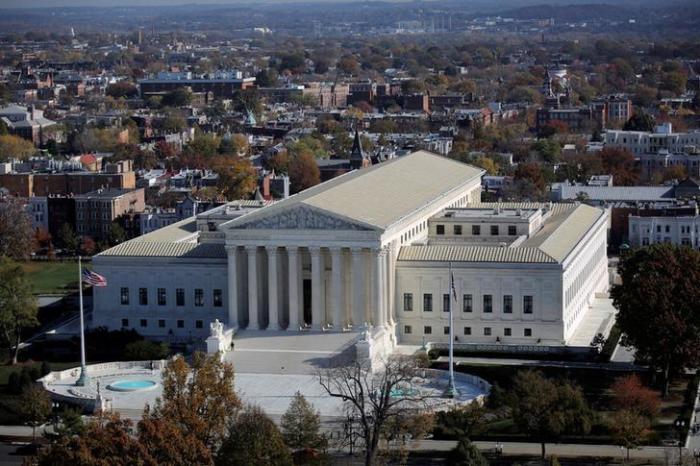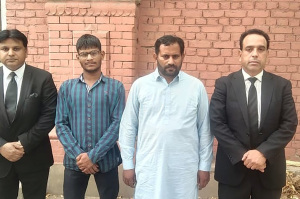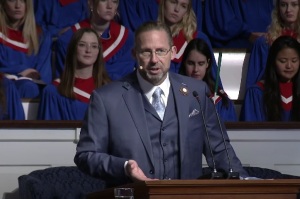Texas hospital asks US Supreme Court to allow removal of toddler's life support

After state courts rejected requests to withdraw life support from a young child, a Texas hospital has asked the U.S. Supreme Court to weigh in.
Cook Children’s Medical Center in Fort Worth, Texas has repeatedly asked lower courts to permit it to withdraw life support from 21-month-old Tinslee Lewis, who was born prematurely and with a heart defect.
Lewis has spent much of her short life in the hospital.
Lewis’ mother, Trinity, began her legal battles with the hospital back in November 2019, when it enacted a 10-day rule against her wishes.
The 10-day rule has been described by the national pro-life activist organization Live Action as an “unethical and institutional power play" that "allows families just 10 days to find a new hospital for their family members on life support after the hospital they are currently using decides to remove life support."
In July, a state appeals court in Fort Worth issued a 2-1 ruling blocking the hospital from removing Lewis from life support against her family’s wishes. The ruling allowed Trinity Lewis to move ahead with a legal challenge against the 10-day rule.
Cook Children’s Medical Center took the battle all the way to the Texas Supreme Court, hoping that it would reverse the injunction. Ultimately, the Texas Supreme Court rejected the appeal from Cook Children’s Medical Center last month, pushing the case back down to the district court level.
According to Texas Right to Life, a pro-life activist group, the hospital filed an appeal to the U.S. Supreme Court on Tuesday.
“Placing a countdown on patients cuts their lives short. Cook Children’s planned to pull the plug on baby Tinslee a year ago today, claiming her death was imminent, but one year later, Tinslee proved them wrong," Kimberlyn Schwartz, director of media and communication at Texas Right to Life, said in a statement.
"The judiciary thus far has recognized that the statute violates patients’ rights to life and due process. We are stunned that a hospital is so desperate to end the life of a patient entrusted to their care.”
According to WFAA, Cook Children’s Medical Center maintained in court filings that Tinslee Lewis requires “deep sedation and paralysis” to “facilitate mechanical ventilation, decrease the pain caused by daily cares, and mitigate events that can lead to significant deterioration in her condition.”
One of her physicians, Dr. Jay Duncan, testified that Lewis “cannot recover … and has no chance of long-term survival.”
Texas Attorney General Ken Paxton filed an amicus brief to the state court in January siding with the Lewis family. In a statement, Paxton argued that the case "presents a life-or-death decision."
“The right-to-life and the guarantee of due process are of the utmost importance not only to baby Tinslee and her family but to all Texans," Paxton said.
While the hospital claims that Lewis is without visitors 99% of the time, Trinity Lewis pushes back on that claim by pointing to COVID-19 visitor restrictions as the reason why she is unable to visit her daughter.
“Cook’s recent court filings don’t tell the truth about my little girl’s condition and show Cook will say anything to have my daughter’s life ended," the mother said in a statement in October.
Texas Right to Life rejects Cook Children’s premise that no other hospital will agree to treat Tinslee Lewis, arguing that other hospitals will agree to admit her if a tracheostomy is performed, which Cook has refused to do.
Asserting that Lewis’ story has “touched the lives of other people,” the pro-life organization said that “families of over a dozen patients have called Texas Right to Life for help after hearing Baby Tinslee’s saga and were rescued from the 10-Day Rule.”
One high-profile supporter of keeping Lewis alive is Bobby Schindler, the brother of the late Terri Schiavo.
Schiavo, who spent several years in the hospital, had her life support removed in 2005 against the wishes of Schindler and others. In a 2019 statement, Schindler cited Lewis’ case as another example of hospital clinicians deciding to stop treatment “not because of a terminal illness – but based on a one-sided ‘quality of life’ determinations.”
“A patient ought to have access to basic life-sustaining treatment, rather than battling hospitals incentivized to remove wanted and efficacious treatment," he said at the time.
"The Texas 10-Day Rule has become a weapon for institutions to devalue people with illnesses and disabilities like my sister, Terri Schiavo. Texas should repeal the 10-Day Rule, rule the law unconstitutional and protect Tinslee – and all patients – right to receive life-affirming care."





























